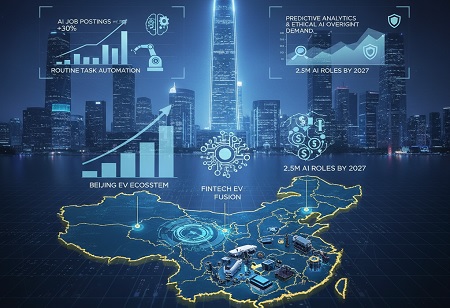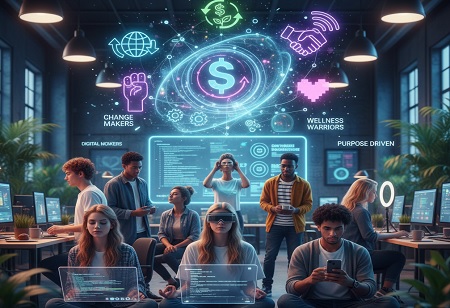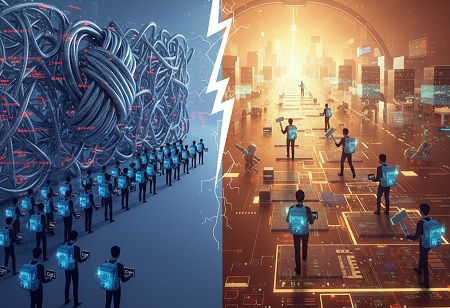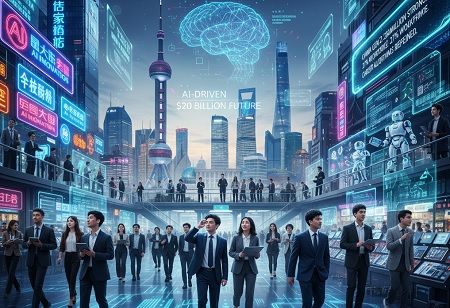-
- AI is reshaping careers in China’s tech hubs, creating hybrid, future-ready roles.
- Gen Z embraces AI as a growth enabler, prioritizing skills, purpose, and adaptability.
- Upskilling and niche focus unlock opportunities in green tech, robotics, and AI-driven innovation.
In the neon-lit sprawl of Beijing's Zhongguancun, Shanghai's Pudong skyline, and Shenzhen's Huaqiangbei bazaar China's exciting tech hubs artificial intelligence (AI) is not just a tool, it's a tidal force redefining ambition. As of September 2025, China's AI sector has ballooned to a $200 billion valuation, with generative AI investments surging 45% year-over-year, according to recent report. For Gen Z, numbering 260 million and comprising 27% of the workforce, this means vocational paths once fixed in rock are now fluid algorithms.
The World Economic Forum's (WEF) Future of Jobs Report 2025 projects that AI and robotics will automate 9 million jobs by 2025 but create 11 million new ones, primarily in tech hubs where 83% of respondents view AI as net beneficial. Yet, this isn't a tale of displacement, it's a call to reinvention. For students eyeing these hubs, the shift demands a blend of technical prowess and human resilience turning potential risk into personal agency.
Fueling Demand in Tech Epicenters

China's tech hubs are ground zero for AI's vocational transformation. Beijing, home to 40% of national AI patents, saw a 30% spike in AI-related job postings in H1 2025. Shanghai's fintech fusion and Shenzhen's hardware heartbeat amplify this, the latter's drone and EV ecosystems alone project 2.5 million AI-adjacent roles by 2027. McKinsey's 2025 workplace report notes that gen AI has accelerated automation of routine tasks by 20%, but in complementary domains like predictive analytics and ethical AI oversight, demand has doubled.
Recent reports underscore the scale. The Stimson Center's September 2025 analysis warns of a ‘China Shock 2.0’, where AI could enhance productivity in half of exposed jobs while disrupting the rest yet China's 97 million global AI job creations by 2025 tilt optimistic. For Gen Z students, this translates to hubs as launchpads, entry-level coding gigs evolve into hybrid roles blending AI with domain expertise, like urban planning AI for smart cities. Pro tip, Target certifications in TensorFlow or PyTorch via platforms like Coursera's China partnerships hubs report 15-25% salary premiums for such skills.
Gen Z's Mindset

Deloitte's 2025 Gen Z and Millennial Survey, polling 23,000+ across 44 countries including China, reveals a cohort laser-focused on the trifecta, money (top priority for 62%), meaning (94% deem purpose essential), and well-being (67% link positive mental health to societal impact). In China, 70% of Gen Z express job security fears from AI, yet 67% of Zoomers (AI-optimists) plan increased personal gen AI use, contrasting global Doomers at just 4%. This pivot is realistic. Unlike predecessors, China's Gen Z favors lily pad careers nimble hops over ladders with 50% rejecting ethically misaligned roles.
"As Gen Zs and millennials navigate a rapidly changing world of work, they are reevaluating the capabilities they need to succeed and the support they want from their employers”, says, Elizabeth Faber, Deloitte Global Chief People & Purpose Officer.
Next-Gen Careers in China’s AI Era

Beijing's response is overconfident. The 2021-2025 Five-Year Plans’ high-quality workers mandate concludes in the Vocational Skills Training Initiative (2025-2027), targeting 30 million upskillers in strategic sectors like semiconductors and renewables 46% of global green jobs are Chinese. March 2025's education ministry directive mandates AI vocational courses nationwide, starting in Beijing, to combat 12.2 million youth unemployment.
Gen Z in China defies stereotypes of risk hate, embracing AI as a career accelerator. As per 2025’s report reveals 60% of Chinese Gen Z interns view AI as an enhancer, not eradicator, of roles contrasting global peers' 40% anxiety rate with 92% confident in adapting to 20% automation in entry-level jobs. In tech hubs, preferences skew toward hybrid vocations: 45% favor AI-augmented creative fields like digital content curation in Hangzhou, per LinkedIn's 2025 China Workforce Report, up from 25% pre-2024.
Also Read: Retrained C-Suite Leaders Powering Asia's Startup Surge
Challenges and Opportunities

Despite momentum, hurdles persist. Entry-level tech jobs in China dipped 15% in H1 2025 due to AI efficiencies, hitting Gen Z hardest in oversaturated fields like basic data entry. In hubs, technological anxiety affects 25% of young workers, exacerbated by demographic pressures, China's shrinking workforce demands hyper-specialization.
Yet, opportunities abound AI's 26% global job growth in 2025 extremely benefits reskilled youth, with China's hubs offering internships yielding 20% higher employability.
Students can navigate this by:
- Enrolling in hub-tied vocational tracks, like Beijing's AI policy certifications.
- Building portfolios via open-source AI projects on GitHub China.
- Networking at events like the 2025 World AI Conference in Shanghai.
Long-term, focus on emerging niches, AI for green tech in Shenzhen or robotics ethics in Beijing, where demand outpaces supply by 40%.
Preston, CEO of Goodwill Industries, says, “The impact is already visible. AI-driven layoffs are underway in call centers, sales roles, and other entry-level positions. We are preparing for a wave of unemployed young people as well as others because of AI”.
Wrapping It Up!
Gen Z students, this shift is your work. China's AI vocational shifts aren't erasing Gen Z paths they're rearchitecting them for ingenuity. By 2030, empowered students will drive a $1 trillion AI economy. So start from now, audit your skills, align with hub ecosystems, and view AI as ally, not challenger. The future belongs to the adaptive.
🍪 Do you like Cookies?
We use cookies to ensure you get the best experience on our website. Read more...

